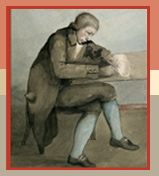
Other works
A Short Account of the Ancient British Bards
Autobiographical material by Iolo Morganwg
Y Bardd yn Dychwelyd i Forgannwg Wedi bod Flynyddau lawer yn Lloegr
Barddoniaeth Dafydd ab Gwilym (1789)
Cyfrinach Beirdd Ynys Prydain (1829)
Dagrau yr Awen neu Farwnad Lewis Hopcin Fardd, o Landyfodwg ym Morganwg
Introduction to The Myvyrian Archaiology of Wales:
Letter to the Gentleman's Magazine (1789)
Lewis Morris, Sarcasm on Cardigan
The Myvyrian Archaiology of Wales (1801–7)
Plan of the Analytical Dissertation on the Welsh Language, by E.W.
Poems, Lyric and Pastoral (1794)
The Primacy of South Wales (NLW 13128A, p. 302)
Salmau yr Eglwys yn yr Anialwch
The Heroic Elegies of Llywarç Hen (1792)
The concise description of Iolo's version of Bardism contained in William Owen Pughe's book represents Iolo's dynamic engagement with the radical politics of the 1790s. It concentrated on the rationale and ceremonial of the ancient Welsh Bards and Druids, their maxims, tenets of religion, the discipline of the bards, the qualification to their ranks, and a selection of pertinent triads.
Here, Bardism was trumpeted as a system whose principles derive from the patriarchs: 'a system embracing all the leading principles which tend to spread liberty, peace and happiness amongst mankind' (p. xxiv). Its leading maxims were peace, the free investigation of matters which attained to truth and wisdom, the equality of members and the transparency of Gorsedd activity. The mixture of received learning on the Druids and contemporary concerns was most clearly seen in the description of the religious tenets of Bardism: the bards purportedly believed in metempsychosis, they retained the pure Christian religion throughout the centuries of Roman Catholicism ascendancy, and Quaker teachings had also left their imprint on them. The lexicographer John Walters, Iolo's friend and mentor, clearly believed Bardism as it appeared in Heroic Elegies was a collaborative effort, a 'made Dish':
cooked up from obscure scraps of the ancient Bards, and the Cabala (the pretended arcana) of the modern ones; a superficial acquaintance with the Metempsychosis; and these ingredients spiced with an immoderate quantity of wild Invention. It is a species of Free Masonry . . . All that I shall further say on the Subject is that Mr Owen and his Coadjutor have not clubb'd their wits for nothing. (John Walters to Edward Davies, 3 May 1793, Cardiff 3.104, vol. 6, no. 3)


